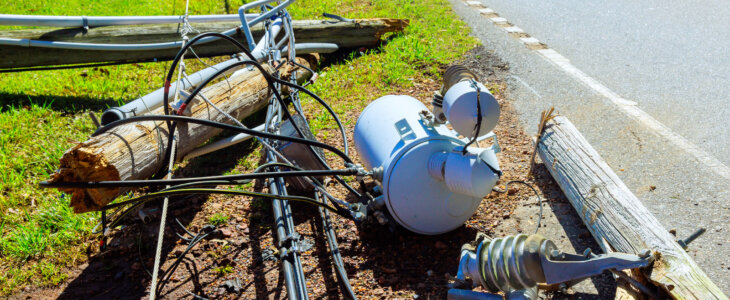When power lines come down, the results can be devastating. High-voltage electricity and heavy utility poles pose serious risks to anyone nearby. Victims can suffer electrical burns, electrocution, crush injuries, and even wrongful death. In California, questions of liability often center on the utility company’s duty to maintain safe equipment and protect the public. Understanding who may be responsible and what compensation may be available is an important first step for anyone injured in these accidents.
Utility Company Responsibility
Utility companies are legally required to inspect, maintain, and repair their equipment. Power lines must be kept in safe working order, and poles or support structures should be regularly monitored for signs of wear or instability. When companies fail to do so, the results can be catastrophic. Common causes of falling lines include:
- Poor maintenance of poles, wires, and transformers
- Failure to trim nearby trees or vegetation
- Inadequate inspections after storms or high winds
- Defective equipment or outdated infrastructure
If a utility company does not take reasonable steps to prevent foreseeable hazards, it can be held financially responsible for injuries.
Electrical Hazards and Injuries
Fallen power lines are especially dangerous because electricity is invisible and unpredictable. Victims may suffer:
- Severe burns from direct contact or arcing electricity
- Cardiac arrest or internal damage from electric shock
- Neurological injuries impacting mobility, memory, or cognitive function
- Death, often instant in high-voltage cases
Even bystanders attempting to help can be hurt. The ground near a downed line can carry live current, creating a zone of risk that is difficult to detect.
Crush Injuries from Collapsed Equipment
Falling poles, transformers, or attached equipment can also cause traumatic injuries. A collapsing utility pole may strike vehicles, pedestrians, or nearby buildings. Victims often face:
- Broken bones or spinal injuries
- Internal bleeding and organ damage
- Long-term mobility limitations
These injuries can require extensive medical treatment, physical therapy, and time away from work, all of which increase the financial strain on families.
Safety Protocols and Prevention
Both utility companies and individuals have roles to play in preventing accidents. Companies must implement safety protocols such as routine inspections, storm-response plans, and vegetation management programs. When these protocols are ignored, the risk to the public rises dramatically.
For individuals, safety means knowing how to respond if you encounter a downed line:
- Never approach or touch a fallen power line
- Stay inside your vehicle if a line falls on it, unless fire forces you to exit
- Call 911 and alert the utility company immediately
- Keep others away from the area
These steps can save lives and help establish the circumstances of the incident for any later legal claim.
Compensation for Electrical and Crush Injuries
Victims of falling power lines may be entitled to compensation for the full range of damages. This often includes:
- Medical bills, hospital stays, and ongoing care
- Lost income and reduced future earning capacity
- Pain and suffering
- Long-term disability or disfigurement
- Wrongful death benefits for surviving family members
Because these cases often involve powerful utility companies, pursuing a claim requires thorough investigation, technical knowledge, and strong legal advocacy.
Holding Negligent Parties Accountable
At Casper, Meadows, Schwartz & Cook, we understand how devastating electrical and crush injuries can be. Our team has the resources to investigate utility company negligence, gather expert testimony, and fight for the compensation you deserve. By holding negligent parties accountable, we not only help our clients recover but also push for safer practices that protect the community.
Protecting Your Rights After a Power Line Accident
Falling power lines present life-threatening risks, and those responsible for maintaining them must be held accountable when negligence leads to harm. Victims should not have to carry the burden of medical costs, lost income, and lasting pain alone. If you or a loved one has been injured in a power line accident, reaching out for experienced legal guidance is one of the most important steps you can take. Call Casper, Meadows, Schwartz & Cook today for a free consultation.
Frequently Asked Questions
Who is responsible if I’m injured by a falling power line in California?
Utility companies are often responsible if they failed to properly maintain, inspect, or repair their equipment. In some cases, contractors or property owners may also share liability.
What should I do if I see a downed power line?
Stay far away, avoid touching anything in contact with the line, call 911, and notify the utility company. Never attempt to move the line yourself.
Can I recover damages for medical bills and lost wages after a power line injury?
Yes. Victims may be entitled to compensation for medical costs, lost income, long-term care, and pain and suffering. An attorney can help determine your full claim.


